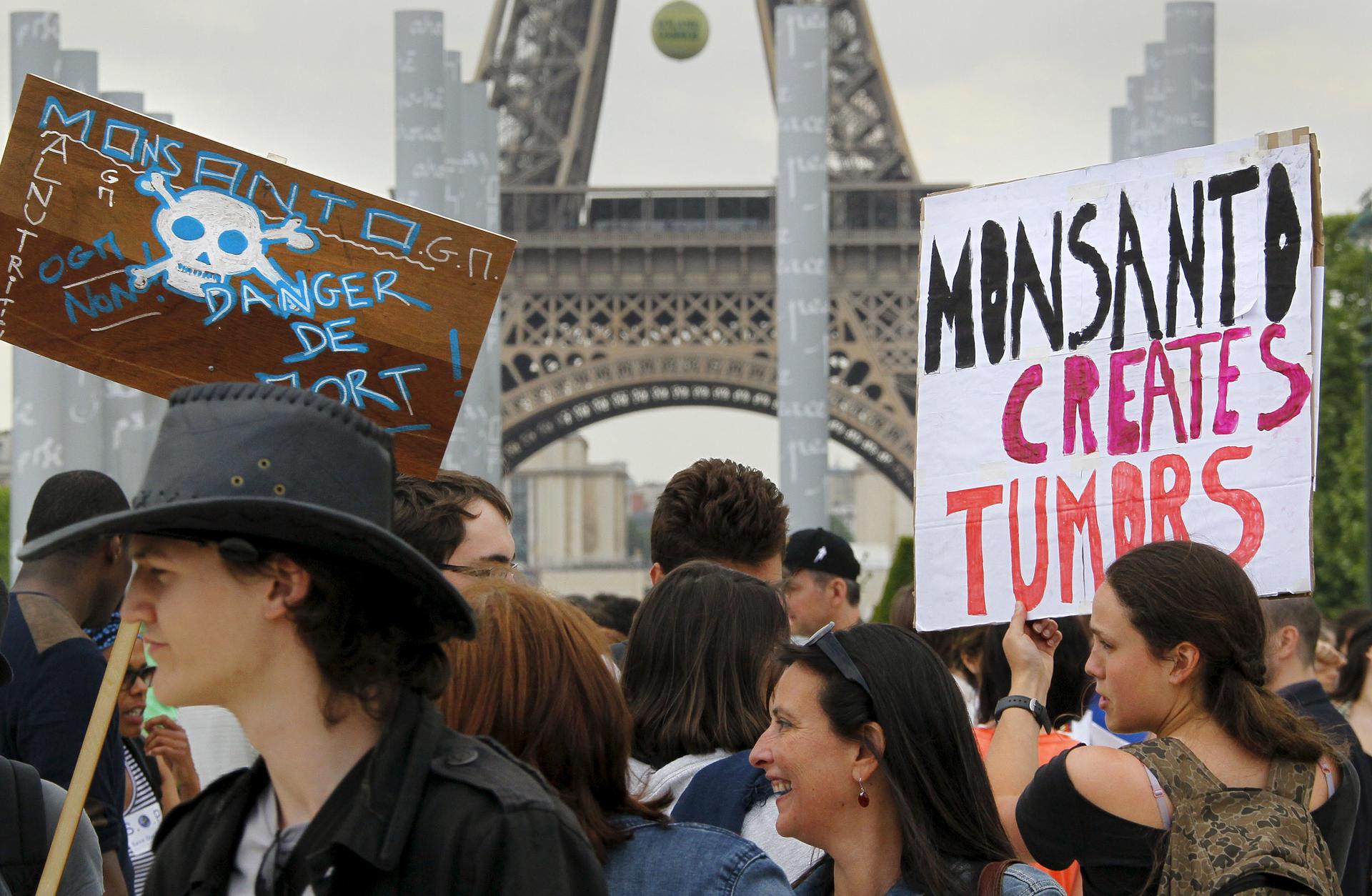Protests and cancer concerns raise doubts for Roundup’s future in Europe
Demonstrators participate in a protest march against Monsanto Co, the world’s largest seed company, in Paris, France, May 23, 2015. People in 48 countries and 421 cities took part in protest marches against Monsanto and its glyphosate-containing Roundup herbicide.
Roundup, the most commonly-used pesticide in the world, faces an existential crisis.
Ever since the World Health Organization in 2015 declared glyphosate, Roundup’s active ingredient, a probable carcinogen, European regulatory agencies have been rethinking its future.
A key European Union panel renewed glyphosate’s license just days before it was set to expire, but the renewal is for only 18 months, which will continue to keep the product under a cloud of doubt. And while it may be popular among farmers, it is increasingly unpopular among European citizens who fear its possible health effects.
Citizens have been literally marching in the streets to protest the use of the herbicide — with an intensity that has surprised Nathan Donley of the Center for Biological Diversity.
“European regulators thought that this was going to be a walk in the park to re-approve glyphosate,” Donley says. “But the public is starting to speak with one voice on this. The anger and the uproar that’s happening in Europe right now — that decision will potentially affect people’s health.”
Advocacy groups in the US are closely watching the European battle over glyphosate, and Donley says the US Environmental Protection Agency is also taking note. “I think EPA, right now, is waiting to see how this all plays out in Europe, because the last thing they want is people protesting in the streets over here,” he says.
Glyphosate is valuable for commodity farmers because 20 years ago, scientists at Monsanto figured out how to genetically immunize corn and soybeans against the herbicide. With Roundup Ready seeds, farmers can spray fields and kill weeds without damaging their crops.
Tom Driscoll, the director of conservation policy and education for the US-based National Farmers Union, says a possible ban in Europe won’t necessarily affect policy in the United States.
“We have very different approaches and what they do over there will not have a consequential bearing on our ability to use glyphosate in the US,” Driscoll maintains. “However, it would possibly affect prices on inputs because of the loss of the European market; it might cause glyphosate to become more expensive in the US.”
Exacerbating the issue is a disagreement about glyphosate’s possible health impacts, says Nathan Donley. Last year, the IARC, which is the cancer research arm of the World Health Organization, found that glyphosate is a probable human carcinogen. “They looked at epidemiological data; in at least one of the studies, glyphosate exposure was correlated with non-Hodgkin’s lymphoma, which is a rare form of cancer,” Donley says.
They also looked at other lines of evidence, Donley says, and came to the conclusion that there was sufficient evidence that glyphosate could induce DNA damage, which can be a pathway to cancer.
But in November 2015, the European Food Safety Authority, or EFSA, found that glyphosate was “unlikely” to cause cancer in humans. In the US, the EPA released a report that also said glyphosate was unlikely to cause cancer. That report was posted online in late April, but disappeared three days later. The EPA says that, although the report was labeled “final” on every page, it was prematurely released.
Donley blames politics for these conflicting decisions. “The European Union and the EPA, unfortunately, have political considerations that they have to contend with. And ultimately, this is weakening regulatory oversight,” Donley says. Monsanto says that politics aren’t in play, and that the assessment “has been one of the most thorough evaluations of an agricultural product ever conducted.”
But Driscoll, of the National Farmers Union, thinks regulatory agencies like EPA aren’t evaluating pesticides for safety as effectively as they could.
“EPA needs more resources in order to be able to process more of these applications,” Driscoll says. “As it stands, the registration process is rather tedious and expensive, so the crop-protecting companies are under tremendous pressure to maximize profits on the products that do make it through registration, and that kind of crowds other options out of the market.”
While the European Union has now kicked the can down the road at least 18 months, it could take years to determine the safety of this and other pesticides in common use.
This article is based on a story that aired on PRI's Living on Earth with Steve Curwood
